|
By: Joanna Shenk 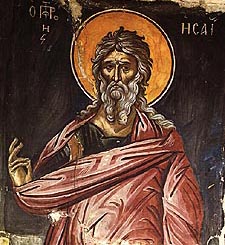 Note: Sermon preached at First Mennonite Church of San Francisco and originally posted at Radical Discipleship. Isaiah 58:1-12 When my older brother went to college, I remember being taken aback when he said his roommate’s mom was an anarchist. I felt so sorry for his roommate and figured he probably had a terrible childhood. In my mind, being an anarchist meant something related to the anti-christ. It was all one category to me because I thought it was all related to the same word. Fast forward to seminary, after I had learned to spell better and had a bigger vocabulary, and I realized the words weren’t synonymous… I heard about this website called Jesus Radicals that was coordinated by a couple people on campus at Anabaptist Mennonite Biblical Seminary. I learned that the point of the website was to put Christianity and anarchism in conversation with each other. That seemed curious to me and the people who ran the website seemed cool. Through conversation and overtime it just started to make sense to me that people in the Anabaptist tradition would be influenced by anarchism. It was also around this time that I realized feminist was not a scary label either. It just made sense to me that every person regardless of gender should be respected as fully-human and that people following Jesus would want to undo systems of power.
Comments
6/17/2015 Comments For the Animals... Author's note: I was invited to write an article on the ethical and spiritual character to vegan practice by Timbrel: Women in Conversation with God Together, the magazine of Mennonite Women USA. The following is an edited version of what was published in the spring 2015 issue. The wolf shall lie with the lamb, the leopard shall lie down with the kid the calf and the lion and the fatling together, and a little child shall lead them. They shall not hurt or destroy on all my holy mountain for all the earth will be full of the knowledge of the Lord -- Isaiah 11:6, 9 (New Revised Standard) I do it for the animals. On the surface, this appears to be a simple answer to a fairly straightforward question: why are you vegan? Yet my commitment to veganism is influenced by my understanding about God, the place of people in creation, the purpose of other animals and the nature of the “good news,” as well as how I read the Bible. It is also tied to my identity as a Black Anabaptist woman who works at undoing oppression. These lenses have led me to see other animals in ways that conflict with the dominant logic of our day, which is itself shaped by various values, beliefs and theologies.
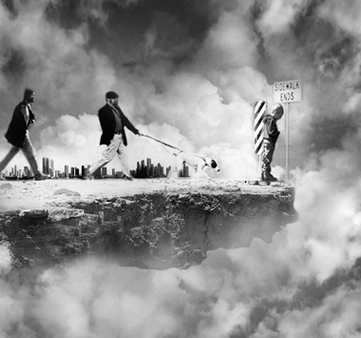 Once the sidewalk ends the connection between humans and ground (Latin: humus) becomes primary. To step off the sidewalk is to reconnect with our primal origins as earth creatures created or evolved (take your pick) for life on this particular planet in this particular atmosphere. To step off the sidewalk is to retouch our wild indigenous selves. The classic Christian spiritual disciplines do serve an irreplaceable role in connecting us with the work of God in the world. They are the necessary but insufficient foundation for Christian discipleship in the twenty-first century. But our relationship with our bodily and earthly identity is conflicted in the classic tradition. In the classic tradition the wild, indigenous self is to be feared and therefore colonized and converted. Many people today recognize the false promises and destructive impact of modern civilization. We often do not know what alternatives exist. Most of us have an unsatisfied desire for wildness and mystery that neither school nor church, neither therapist nor pastor can address. For over two hundred years under the flags of modernity and progress our civilization has been diminishing the biotic capacity of this planet. We have already reached the point of no return. Our ability to effectively respond to our dilemma has been perilously handicapped by dysfunctional political systems and societies that can no longer nurture humans to full maturity and adulthood.
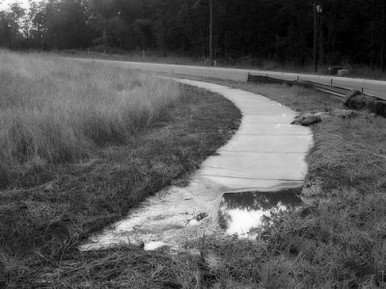 Navigating America’s suburban sprawl without an automobile is almost impossible as well as dangerous. Without sidewalks (or bicycle lanes) the automobile reigns supreme. The only safe way to avoid captivity in your suburban home is to submit to the imperatives of a fossil fuel economy, risk life and limb alongside speeding traffic, or flee the suburbs for the city or the country. There is something virtuous about sidewalks in providing a safe, effective means for people who prefer to walk rather than drive. However sidewalks have their limitations. Having a sidewalk may be better than not having a sidewalk. The sidewalk may take you where you want to go; but sidewalks only take you where those who poured the sidewalk wanted you to go. As Shel Silverstein reminded us long ago: the adventure begins where the sidewalk ends.1 I want to draw upon Silverstein’s metaphor to explore the practice of spiritual disciplines in contemporary radical Christian practice. Classic spiritual disciplines have their necessary function. They should be taken more seriously than they often are. My thesis however is that the classic practices of formation do not form radical Christians because they were never intended to. 5/23/2012 Comments Prayer as Resistance, Part 2
 Karl Barth once said “the clasping of the hands in prayer is the beginning of an uprising against the disorder of this world.” In this two part essay I talk about Barth’s understanding of prayer as a form of Christian resistance. Part one described Barth’s understanding of Christianity as resistance. Part two will now describe how Barth understands prayer as a form of resistance. Barth wrote over 500 pages on prayer alone. It has a significant place in every volume of his Dogmatics. It is also crucial to his ethics in that Barth roots human freedom in the practice of prayer. Prayer is the human action that declares God’s freedom as primary and human freedom as a response to God. Prayer is how we enter into God’s freedom and follow it into the world. When we pray we take up a posture that reveals our true humanity, uniting what we do with who we are. Barth’s makes the forceful claim that “prayer is literally the archetypal form of all human acts of freedom in the Church, and as such it must be continually repeated in all other acts of freedom.”1 5/18/2012 Comments Prayer as Resistance, Part 1
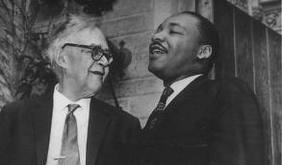 Karl Barth is reported to have once said “the clasping of the hands in prayer is the beginning of an uprising against the disorder of this world.”1 In this two part essay I will talk about Barth’s understanding of prayer as a form of Christian resistance. Barth (1896-1969) was the most prolific and influential Protestant theologian of the twentieth century. I will not attempt to introduce him here. But I hope that what I have written will be accessible and helpful even to those who have only read a little of Barth or never read him at all (or perhaps even heard of him!). Whether we are interested in Barth or not, the central issue for this essay is significant for everyone. How do we understand the relationship between our private and public lives as followers of Jesus? How is spirituality related to politics? What does prayer have to do with resistance? I find Barth’s thoughts on this to be a compelling proposal for thinking about the unity of prayer and politics. Rather than understanding prayer as a withdrawal from the public square perhaps we should understand prayer as a primary form of worldly engagement. Part one will describe Barth’s understanding of Christianity as resistance. Part two will then describe how Barth understands prayer as a form of resistance. 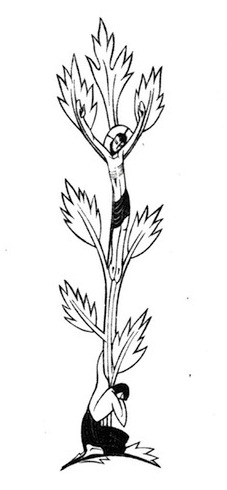 There is a very real temptation, when exploring the intersection of Christianity and anarchism to simply force one category into the other. I see this all the time. There are those who simply believe that their Christian tradition is so inherently anarchistic that they can simply “claim” anarchism. They trump all other anarchisms in such a way as to dimiss them entirely. There is a danger in this: it creates theological ghettos increasingly unable to respond to current political and spiritual crises. Theological ghettos simply assume that everyone else should be like them while the world and its people continue to rush headlong towards the abyss. And there are those who see Christianity as a useful tool on one’s journey towards anarchism. They see anti-domination as their true god, and even Christ serves to bring people to this god. The danger of this temptation is that anything sacred becomes scrapped for parts to a cause that will never arrive. The inner transformation necessary for social liberation cannot be obtained simply through structural analysis. There is a reason Marx was never a Marxist. There is a reason why many of my most brilliantly anarchistic friends come off as authoritarian. There is simply more oppressing us than social structures. And more is required for us to embrace our fullest humanity than tearing down oppressive structures and replacing it with our clever utopias. If one is a Christian anarchist, who largely congregates with other anarchists, then it could easily be understood that one’s Christianity is simply their own flavor of anarchism. And, when the chips come down, anarchism is what it’s all about. Likewise, if one is a Christian anarchist, then one could easily feel that one’s anarchism is simply a political affiliation…and that, being in fellowship with militaristic Capitalist patriotic Christians is more important than seeking liberation. Neither appeal to me. 2/22/2012 Comments A Lenten Reflection on Shame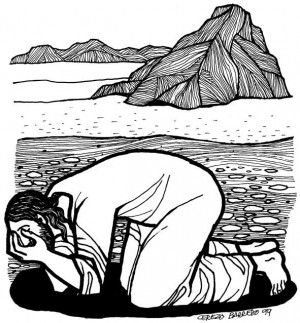 Today is Ash Wednesday, the beginning of Lent. For many Christians, it is a season of repentance. I’ve been thinking a lot about repentance lately, since I’m writing a book on repentance. I’ve become increasingly aware of the inability of our culture to embrace repentance. By “our culture” I mean white western culture–particularly as expressed in the United States. We are enmeshed within a cultural ethos that looks forward. We assume that progress will resolve the problems of the past without requiring us to embrace lives of repentance. We learn history, but when we notice injustices in the past, we are urged to move on–to consume the information–but must not dwell there. To dwell in the past is seen as anti-social. However, repentance means coming to terms with the past–to not only own our complicity and relationship with past (and ongoing) wrongs, as well as return to those stories that should shape us as followers of Jesus Christ. By: Ric Hudgens 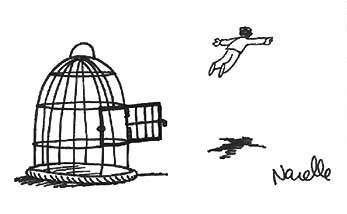 At the beginning of the twentieth century it was theologian Karl Barth who first raised the question of a domesticated God: a God tamed, confined, and muted by humanity’s drive to control and domination. Only a few years later Europe saw that the progressive domestication of God did not lead to freedom but to the furnace and the gulag—not to the heavenly city of the eighteenth century Enlightenment philosophers, but to the hell of the twentieth century totalitarians. The church has been just as afraid of an undomesticated, wild God as the world has been. When Moses heard the voice of the Lord in the desert at Sinai and asked for a name he was told, “I will be who I will be”—deal with it! When Jesus tried to talk about the basileos of God he had to reach for verbal and enacted parables because this movement’s exact outlines could never be fully anticipated. When the Holy Spirit came on Pentecost the early church began an unpredictable “wild goose” chase, starting new Jesus-communities everywhere they were led. |
Disclaimer
The viewpoints expressed in each reader-submitted article are the authors own, and not an “official Jesus Radicals” position. For more on our editorial policies, visit our submissions page. If you want to contact an author or you have questions, suggestions, or concerns, please contact us. CategoriesAll Accountability Advent Anarchism Animal Liberation Anthropocentrism Appropriation Biblical Exegesis Book Reviews Bread Capitalism Catholic Worker Christmas Civilization Community Complicity Confessing Cultural Hegemony Decolonization Direct Action Easter Economics Feminism Heteropatriarchy Immigration Imperialism Intersectionality Jesus Justice Lent Liberation Theology Love Mutual Liberation Nation-state Nonviolence Occupy Othering Pacifisim Peace Pedagogies Of Liberation Police Privilege Property Queer Racism Resistance Resurrection Sexuality Solidarity Speciesism Spiritual Practices Technology Temptation Veganism Violence War What We're Reading On . . . White Supremacy Zionism ContributorsNekeisha Alayna Alexis
Amaryah Armstrong Autumn Brown HH Brownsmith Jarrod Cochran Chelsea Collonge Keith Hebden Ric Hudgens Liza Minno Bloom Jocelyn Perry Eda Ruhiye Uca Joanna Shenk Nichola Torbett Mark VanSteenwyk Gregory Williams Archives
October 2017
|
Search by typing & pressing enter

 RSS Feed
RSS Feed